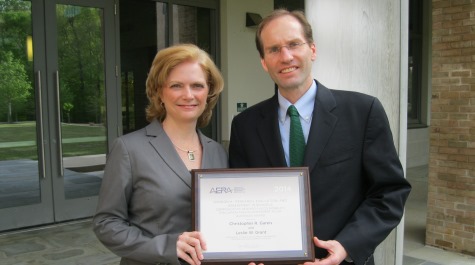Drs. Chris Gareis and Leslie Grant Win AERA Division H Award
The American Educational Research Association (AERA) has a mission to advance educational knowledge and research, and to promote the use of education research in serving the public good. Founded in 1916 to improve education through scholarly inquiry and practical application, AERA annually awards outstanding educators for their research efforts.
This year’s Division H – Research, Evaluation, and Assessment in Schools Outstanding Publication Award has been presented to Dr. Christopher Gareis and Dr. Leslie Grant. Dr. Gareis is the Associate Dean for Teacher Education in The College of William and Mary’s School of Education, and Dr. Leslie Grant is an Assistant Professor in the College’s Educational Leadership program.
Drs. Grant and Gareis submitted materials titled “Assessment Literacy for Common Assessments: A Professional Development Initiative.” Based on their 2008 book Teacher-Made Assessments: How to Connect Curriculum, Instruction, and Student Learning, this collection of professional development training materials was designed and used in Williamsburg-James City County Public School Division to increase teachers’ knowledge, creation, and use of common assessments in the classroom. With the expressed intent of strengthening assessment literacy for teachers and instructional leaders, this professional development initiative focused on creating a core set of knowledge and skills associated with assessment literacy. Drs. Gareis and Grant have long recognized the value in making assessment an integral part of effective teaching, thereby positively impacting student learning. Their assessment related work seeks to both improve assessment related skills and knowledge, and to reduce the negative association many individuals have regarding assessment.
Building from underlying assumptions that assessment is critical to effective teaching and that systemic change takes time, this series of six professional development modules are intended to increase understanding, insight, and confidence in the use of assessment practices for classroom teachers. Materials are developed with the perspective of using assessment for learning (as opposed to the more common use of assessment of learning). In keeping with the standards for professional development advocated by Learning Forward, this initiative was designed to be on-going over several months, job-embedded for relevancy, targeted on specific classroom based skills, systemic, and monitored via structured feedback.
In addition to the work done with Williamsburg-James City County School Division, Drs. Gareis and Grant have also adapted their award-winning materials for use in a series of one-day workshops on assessment literacy, sponsored by the Virginia Department of Education. This training approach is linked to the state’s new evaluation standard, requiring teachers to show evidence of their impact on student learning. They have also adapted the materials for use in a variety of other settings, including professional development on assessment literacy for high-needs urban and rural school divisions, private college preparatory schools, as well as teachers in China, Taiwan, Singapore, and South Africa.
With the current age of educational accountability bringing assessment proficiency needs to the forefront, Drs. Gareis and Grant seek to embody the AERA mission of translating education research in to practical and common use with accessible, feasible, and accurate classroom strategies. By approaching assessment through the lens of a classroom teacher, they have translated their research in to practical competencies that allow education professionals to conceptualize, construct, administer, and interpret assessments in the classroom. These highly relevant and timely strategies represent a seamless transition from the theoretical to the practical, strengthening links between curriculum, assessment and learning for all students.
